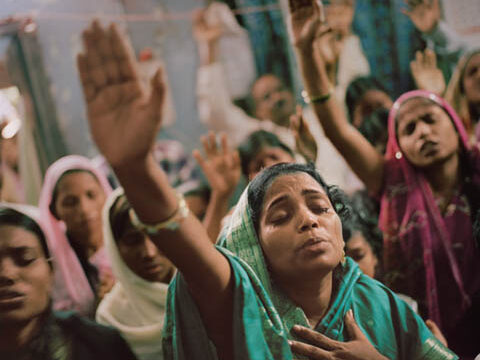After a trip earlier this week to France, India’s Prime Minister Narendra Modi is now in Washington, D.C., visiting with President Trump, Elon Musk, and other key figures in the new administration. Reports indicate that Modi’s meetings are largely centered on economic considerations, including the regulatory approval Musk’s Starlink company is awaiting in India and the threat of increased tariffs between the two countries.
Modi’s visit comes on the heels of a historic electoral victory in the Delhi elections. His party, the BJP, won 48 of 70 seats in the local legislature, handing it its first victory there in almost 30 years. In 2020, it won just eight seats. The BJP, which champions religious nationalism and discrimination against non-Hindus, was sorely in need of such a boost after shockingly poor results in the 2024 general elections forced it into a reduced role as part of a coalition government.
Meanwhile, a report released Monday by the Center for the Study of Organized Hate found a 74% rise in hate speech incidents last year as compared to 2023. About 10% of the 1,165 incidents recorded targeted Christians — a population that makes up just 2.3% of the population according to official estimates — while more than 98% of cases targeted Muslims, either alone or together with Christians.
Interestingly, about 80% of the incidents recorded occurred in states controlled by the BJP, a fact that highlights the party’s role in exposing religious minorities legally and even inciting violence against peaceful Christian and Muslim communities.
Currently, 12 of India’s 28 states have an anti-conversion law: Arunachal Pradesh, Chhattisgarh, Gujarat, Haryana, Himachal Pradesh, Jharkhand, Karnataka, Madhya Pradesh, Odisha, Rajasthan, Uttarakhand, and Uttar Pradesh. In most or all of these cases, a BJP-led government has pushed the creation of these statutes.
Written under the guise of protecting citizens from coercion, these laws criminalize conversions so broadly as to outlaw nearly all minority religious activity. In a typical example, Uttar Pradesh’s anti-conversion law outlaws “conversion from one religion to another by misrepresentation, force, undue influence, coercion, allurement or by any fraudulent means.”
Though international law would back this law up regarding its prohibition of force, the law’s definition of “allurement” is cripplingly broad and itself in tension with international law. Under the Uttar Pradesh law, allurement includes “the offer of any temptation,” including “gratification, easy money … free education in [a] reputed school run by any religious body … better lifestyle, [or] divine displeasure.”
Under this definition, any religious activity could be considered an attempt at forced conversion. Even something innocuous as explaining one’s view of divine pleasure and eternal reward is criminal under the statute.
While these laws have their roots in an early post-colonial India afraid of Western colonists forcing their religion on Hindu Indians, the laws continue to spread decades later under the Modi administration — which began in 2014 — revealing that the concern behind these laws is less with colonists and more with preserving the Hindu-dominated status quo.
In his March 2023 update on India’s anti-conversion laws, Luke Wilson, a researcher for the United States Commission on International Religious Freedom (USCIRF), writes that “India’s enforcement of state-level anti-conversion laws suggests the legislations’ intent is to prevent conversions to disfavored religions — such as Christianity and Islam — and not to protect against coerced conversions.”
International Christian Concern (ICC) regularly sees how these anti-conversion laws make minority religious life in India difficult. ICC works with many pastors attacked by mobs during service because the singing and worship could lead a Hindu to convert to Christianity. Similar mob raids also happen outside church services, sometimes targeting church community outreach programs like food or clothing distributions.

